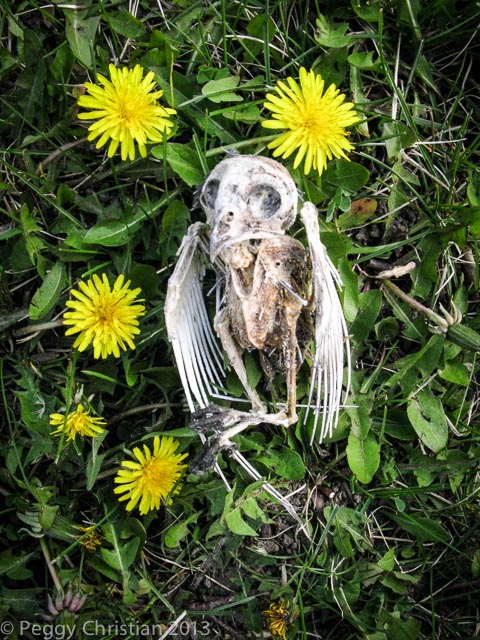 “We stand now where two roads diverge. But unlike the roads in Robert Frost’s familiar poem, they are not equally fair. The road we have long been traveling is deceptively easy, a smooth superhighway on which we progress with great speed, but at its end lies disaster. The other fork of the road—the one ‘less traveled by’—offers our last, our only chance to reach a destination that assures the preservation of our earth.
“We stand now where two roads diverge. But unlike the roads in Robert Frost’s familiar poem, they are not equally fair. The road we have long been traveling is deceptively easy, a smooth superhighway on which we progress with great speed, but at its end lies disaster. The other fork of the road—the one ‘less traveled by’—offers our last, our only chance to reach a destination that assures the preservation of our earth.
The choice, after all, is ours to make. If, having endured much, we have at last asserted our ‘right to know,’ and if, knowing, we have concluded that we are being asked to take senseless and frightening risks, then we should no longer accpt the counsel of those who tell us that we must fill our world with poisonous chemicals; we should look about and see what other course is open to us.” Rachel Carson, Silent Spring
I have just finished re-reading Silent Spring, a book I have not picked up since I read it in college nearly 40 years ago. At that time it was very controversial and I remember the way she was vilified for even suggesting that the brave new world—“better living through chemistry”—was not turning out to be the Eden the chemical and oil companies touted. Re-reading it now I am horrified by how little has changed. True, the book and Carson’s subsequent testimony before congress did have some positive impacts. DDT was eventually banned in this country, though we still sell it overseas. And she was one of the instigators of the broader environmental movement that was spawned at that time. I have always looked to Carson as an inspiration, a shining example of what powerful writing can accomplish. And yet…
And yet, fifty years later “only 200 of the more than 80,000 synthetic chemicals used in the US have been tested under the Toxic Substances Control Act of 1976. And exactly none of them are regulated on the basis of their potential to affect infant or child development.” Sandra Steingraber, Raising Elijah. Coincidentally, just as I was finishing Silent Spring, Bill Moyers had Sandra Steingraber on and her book is the natural sequel to Carson’s. Steingraber says, “(In Silent Spring Carson) posited that ‘future generations are unlikely to condone our lack of prudent concern for the integrity of the natural world that supports all life.’ Since then, the scientific evidence for its disintegration has become irrefutable, and members of the future generations to which Carson was referring are now occupying our homes. They are our kids.”
Steingraber speaks of the moral crisis of our day being two-fold—the pollution of our bodies by toxic chemicals and the alteration of our climate through the accumulation of heat-trapping gasses. Both of these crises are attributable to our economic dependence on fossil fuels.
After outlining the scientific evidence for her arguments, Steingraber presents a compelling case that it is the moral responsibility of all of us to not give in to “well-informed-futility-syndrome”, whereby knowledge about the enormity of a problem becomes incapacitating. Instead we must scale up our actions to match the size of the problem.
I would love to sit back and focus all my time and attention to being a naturalist, to bearing witness to the incredible complexities of nature that abound in my backwoods and beyond. I still believe, as I wrote last year in “New Language, New Way of Thinking” that observing and writing about nature in an effort to restore its sacredness as Jack Turner in The Abstract Wild, “If we find we live in a moral vacuum, and if we believe this is due in part to economic language, then we are obligated to create alternatives to economic language…Emerson started the tradition by dumping his Unitarian vocabulary and writing “Nature” in language that restored nature’s sacredness. Thoreau altered that vocabulary further and captured our imagination. The process continues with the labor of poets, deep ecologists, and naturalists,” is a worthy enterprise, I am beginning to feel that it really isn’t enough. Neither is changing out my light bulbs, driving less, or even growing and canning my own food.
I can’t just throw up my hands in despair, even if any action I take will be insignificant in the face of the power of the economic interests of the corporations. I have to be able to look my children in the eye and not feel shame for my cynicism and cowardice. And so, when I was asked to sign a petition stating that I was willing to be arrested to protest the Keystone Pipeline, I did. You have to make a stand somewhere. And stopping the pipeline and fighting the expansion of fracking in my own state is a place to start. Faced with peak oil, the answer is not to find new and dirtier oil. It is to begin to build an alternative to our fossil fuel economy.
I will still be exploring the backwoods and beyond. But I will also be looking for ways I can keep myself from despair over the state of the world. Reading both Silent Spring and Raising Elijah is good place to start. I don’t want to leave my children a world with a silent spring, and so I can’t be silent any longer.
